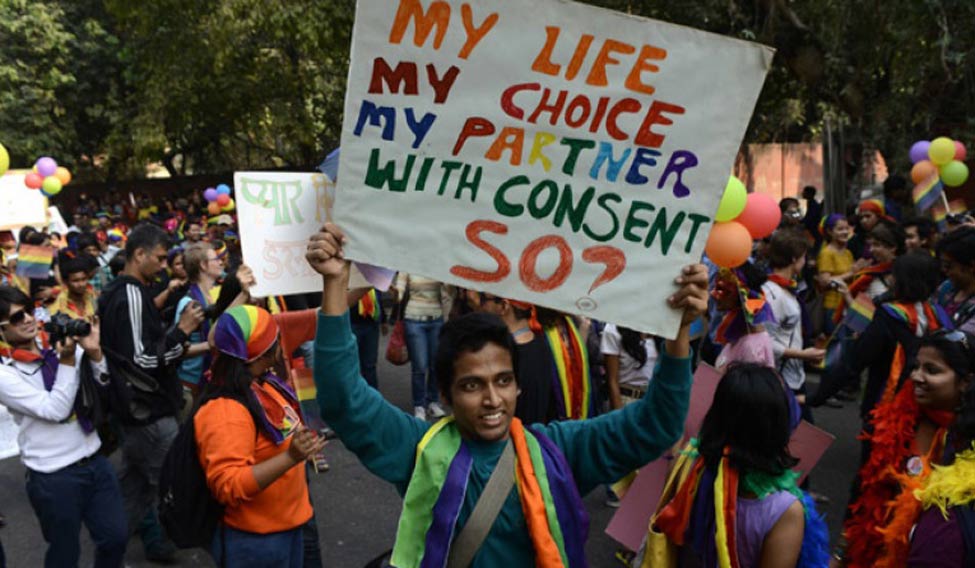A new hope has been kindled in the lesbian, gay, bisexual and transgender community after the Supreme Court recently ruled that Right to Privacy is a fundamental right. Legal experts and gender activists say that it is now only a matter of time before Section 377 of the Indian Penal Code that criminalised unnatural sex and homosexuality is struck down as it is now untenable after the privacy judgment.
It clearly said: “It is an individual’s choice as to who enters his house, how he lives and in what relationship. The privacy of the home must protect the family, marriage, procreation and sexual orientation, which are all important aspects of dignity.” The right of personal choices including sexual orientation was recognised by the judgment.
The Supreme Court pointed out that sexual orientation is an essential component of identity that got hindered when there is a loss of privacy and dignity.
Justice D.Y. Chandrachud made the stand of the court very clear: “Discrete and insular minorities face grave dangers of discrimination for the simple reason that their views, beliefs or way of life does not accord with the ‘mainstream’. Yet in a democratic constitution founded on the rule of law, their rights are as sacred as those conferred on other citizens to protect their freedoms and liberties. Sexual orientation is an essential attribute of privacy. Discrimination against an individual on the basis of sexual orientation is deeply offensive to the dignity and self-worth of the individual. Equality demands that the sexual orientation of each individual in society must be protected on an even platform. The right to privacy and the protection of sexual orientation lie at the core of the fundamental rights guaranteed by Articles 14, 15 and 21 of the constitution. LGBT rights are not so-called but are real rights founded on sound constitutional doctrine. They inhere in the right to life. They dwell in privacy and dignity. They constitute the essence of liberty and freedom. Sexual orientation is an essential component of identity. Equal protection demands protection of the identity of every individual without discrimination.”
There is no ambiguity in this landmark verdict. It will certainly impact a batch of pending curative petitions challenging 377. The SC had held that the right to privacy and the protection of sexual orientation lies at the core of the fundamental rights guaranteed by the constitution. It has thereby strengthened the argument that it violates the right to life and liberty guaranteed under Article 21 of the Constitution.
Activist Anjali Gopalan who heads the Naz Foundation which cares for people with HIV, along with Lawyers Collective, an activist group that fights for human rights, had challenged 377 which criminalises consensual sexual relations between adults of the same sex. After the privacy judgment, she is hopeful that it will be struck down when the curative petition comes up for hearing.
Justice Shah also says that there is now little scope to defend 377.
All eyes are now on the fate of the curative petitions challenging the imposition of 377 in its present form. By reversing its earlier verdict on 377, the SC may help Indians step into a more equitable future where tolerance and understanding can become cornerstones of a new era of openness and also guarantee fundamental liberties to one and all despite their sexual orientation.
Indira Jaising who heads Lawyers Collective and is one of India’s best human rights activists, told The Week: “The striking down of Section 377 is now just a formality as it cannot survive after the privacy judgment.”
In a July 2009 judgment, a Delhi High Court bench headed by the then Chief Justice A.P. Shah struck down 377 saying that it violated principles laid down by the constitution.
In his 105-page judgment, the two member bench of Chief Justice Shah and Justice S. Muralidhar said that if not amended, section 377 of the IPC would violate Article 14 of the Indian constitution that guaranteed equal opportunity and equality before law to all. The judges said that inclusiveness was the underlying theme of the constitution.

The far reaching verdict said 377 was persecuting a community purely based on their sexual orientation and it was against the principles of the constitution. It was hailed as a landmark judgment that gave a fillip to gay rights and also reflected the progressive and tolerant view taken in most parts of the developed world.
However, four years later, the SC reversed this once again criminalising acts ostensibly based on moral grounds. It said that it was for the legislature to decide on the issue and it did not fall in the purview of the court.
Presently, Section 377 punishes with imprisonment for life or for a term of up to 10 years any person who voluntarily has “carnal intercourse against the order of nature with any man, woman or animal”.
The SC judgment on the right to privacy pointed that just because a miniscule fraction of the country’s population constitutes lesbians, gays, bisexuals or transgenders, it cannot be the rationale to deny them the right to privacy.
Many activists who work in the area of LGBT rights remembered with sadness the tragic end of Professor Srinivas Ramachandra Siras of Aligarh Muslim University who committed suicide in 2010 after journalists armed with cameras illegally entered his house at night and filmed him with his partner. After this privacy judgment, this kind of intrusion will be punished, not glorified or sensationalised. The story of the professor was later sensitively adapted by director Hansal Mehta into a Hindi film, Aligarh, which got critical acclaim.
Lok Sabha member Shashi Tharoor bravely attempted to introduce a private member’s bill to decriminalise homosexuality but it was hastily voted down. Parliament was just not interested. He was surprised at the opposition he faced. Three months later, he did try to reintroduce it but failed again.
As we have seen time and again in the recent past, when the legislature fails to do its duty, the judiciary steps in. It is time that the antique Section 377 sculpted by the British in 1860 criminalised “sexual activities against the order of nature” is done away with as India has matured into a modern democracy. Section 377 said that whoever voluntarily has carnal intercourse against the order of nature with any man, woman or animal shall be punished with imprisonment for life, or with imprisonment of either description for term which may extend to ten years, and shall also be liable to fine.
As 157 years have flown past with both India and the world witnessing dramatic change in perception, it is time we display a sense of empathy towards those who are different and have the grace to give them the space they deserve in a free world.




